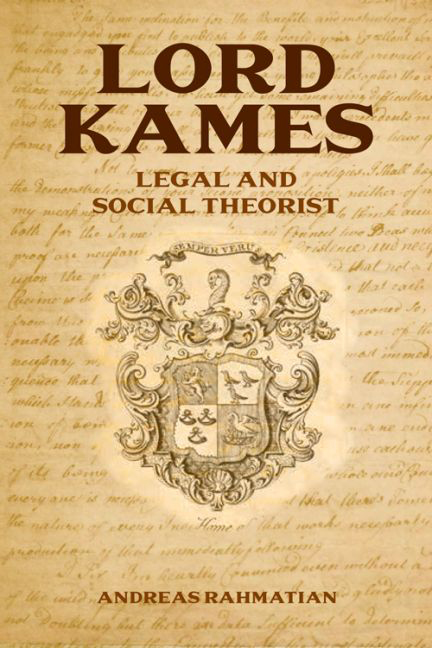Book contents
- Frontmatter
- Contents
- Preface
- Bibliography of Works by Lord Kames and Abbreviated References
- I Introduction
- II Aesthetics
- III Moral Philosophy I: Principles
- IV Moral Philosophy II: Development
- V Political Philosophy, Anthropology and Commerce
- VI Legal History, Legal Science and Comparative Law
- VII Property
- VIII Equity
- IX Obligations and Enforcement
- X Criminal Law
- XI Lord Kames's Influence on Some of the Founders of the United States
- XII A Critical Conclusion
- Bibliography
- Index
- Frontmatter
- Contents
- Preface
- Bibliography of Works by Lord Kames and Abbreviated References
- I Introduction
- II Aesthetics
- III Moral Philosophy I: Principles
- IV Moral Philosophy II: Development
- V Political Philosophy, Anthropology and Commerce
- VI Legal History, Legal Science and Comparative Law
- VII Property
- VIII Equity
- IX Obligations and Enforcement
- X Criminal Law
- XI Lord Kames's Influence on Some of the Founders of the United States
- XII A Critical Conclusion
- Bibliography
- Index
Summary
Lord Kames (Henry Home, 1696–1782) is one of the best-known figures of the Scottish Enlightenment by name, and one of the least known in relation to his actual writings. He is portrayed as a kind of Pantalone (or perhaps Dottore) character of the Scottish eighteenth-century commedia dell'arte, but also as a mover and broker, an incessant promoter of Enlightenment ideas, mentor of younger thinkers, such as Adam Smith and Thomas Reid, friend (at least for some time) of David Hume, an improver of Scottish society and commerce, especially Scottish agriculture. But he was apparently not an original thinker, was domineering and arrogant, and published heaps of books of questionable quality which are only worth quoting to demonstrate oddities of thought and to make the real geniuses of the Scottish Enlightenment, such as Hume or Smith, shine in a brighter light. Kames is said to have dabbled in many unrelated areas, mastered none properly (including law), and was essentially a conservative, derivative writer within the mainstream of eighteenth-century Scotland.
If Lord Kames had indeed been so uninteresting, then somebody else would have had to write this book. The best, sometimes perhaps the only, way to become interested in Kames is to read his works in the original. One notices immediately that Kames is a distinctive three-dimensional figure, and he effortlessly projects his strong opinions, originality and vivacious personality through his texts over 230 years after his death. That may indeed become overbearing for some in a managerialist age where individualism must be professed but must never be lived. Kames had a booming magisterial voice, certainly in his writings and reportedly in real life, and he knew all too clearly what was right and wrong; or, more precisely, as a man of the Enlightenment, he said loudly that he knew exactly that he did not know, and everybody else ought to be equally sceptical.
And sceptical he was, argumentative, disputatious, ‘spikey’, unpredictable, irregular, sometimes incoherent, with a certain principled honesty which never gets recognised. Kames emphatically invites the readers, particularly the lawyers, to engage in independent reasoning and to question authority at any level. There is probably no Enlightenment thinker other than Kames who has addressed the battle cry of the Enlightenment ‘think for yourself’ (Kant's ‘Sapere aude!’) so directly and so specifically to lawyers. Kames was a Scottish judge, jurist, moral philosopher, reformer.
- Type
- Chapter
- Information
- Lord KamesLegal and Social Theorist, pp. vi - viiiPublisher: Edinburgh University PressPrint publication year: 2015

